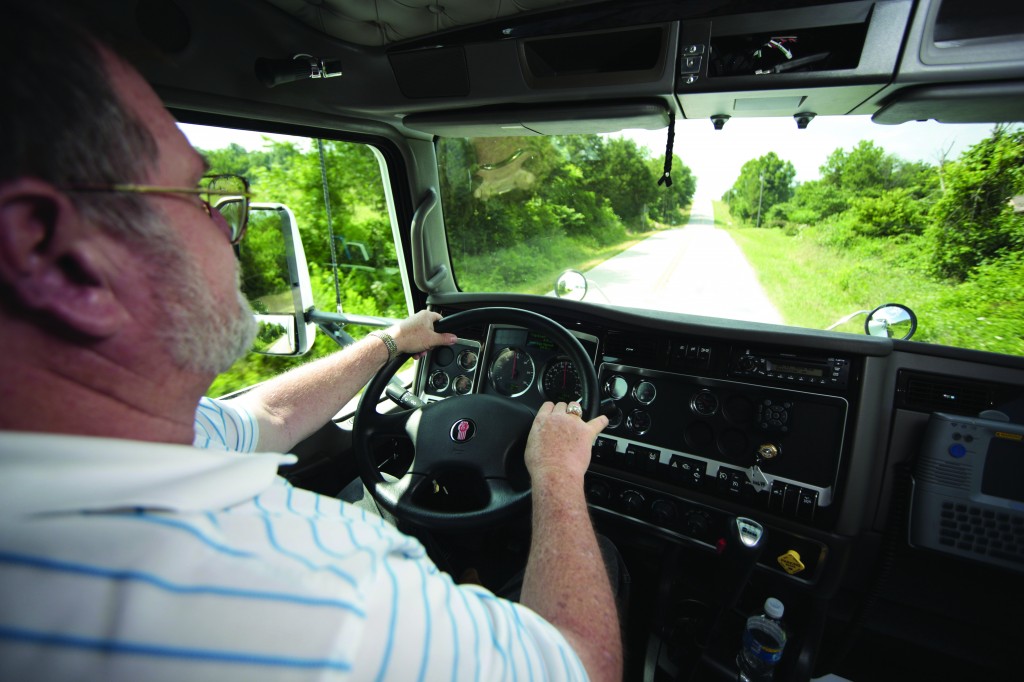
- January 5, 2015
- Katlin Owens
ABS: What Is It and Why Do Drivers Need It?
By: Tim Hicks, Con-way Truckload Driver Advocate
What is ABS?
Abs? The muscles that hurt after doing too many sit-ups?
All Bread Sandwich?
Acrylonitrile butadiend styrene?
No. If we are talking tractor trailers, ABS stands for Anti-lock Braking System.
Anti-lock Braking System (ABS) is a safety system that allows the wheels on a trailer to maintain tractive contact with the road surface while braking, preventing the wheels from locking up. By preventing the wheels from ceasing rotation, ABS helps drivers avoid uncontrolled skidding.
This sounds like a pretty good idea. Under no circumstances would I want to see my trailer passing by me. This can prove to be a great concern for drivers, especially when your tires lock up on wet or slick roads. ABS generally offers improved control and decreases stopping distances, with improved vehicle control.
Is it automatic braking?
No. Professional drivers maintain control of the trailer and have to be aware of road conditions. Roads covered in rain, ice and snow are always going to require more distance to come to a complete stop.
ABS isn’t new; it’s been around for years.
ABS is widely used on production cars, motorcycles, commercial and military aviation, as well as tractor trailers and race cars. Engineers developed the first anti-lock braking system for automobiles in the mid-1970s. Thinking back to when ABS first came out, I remember how dangerous my fellow drivers and I thought it would be. We did not understand how sacrificing control over a trailer’s brakes could increase safety. Over the years, however, the system has proved reliable and prevented numerous costly accidents.
Respecting the ABS light
Whether driving an SUV or a tractor trailer, most motorists do not respect their vehicles warning lights. In the past two years, we have had 64 violations involving the ABS lamps alone. These infractions result in Compliance, Safety and Accountability (CSA) points charged to Con-way Truckload. More points equates to more Scale and Roadside inspections, which cost time and money.
Traditionally, many drivers looked to avoid such infractions by tampering with the ABS light. I have seen drivers unplug or even cut the light’s wires to prevent it from coming on. The dangers involved with doing so cannot be overstated. In doing this, you not only put yourself at risk, but also the drivers who use that trailer after you. Take the time to get the light fixed. Fixing a broken or unplugged ABS light will minimize the problem and promote a safer driving environment for the motoring public. We are the only ones that can truly solve this issue that continues to plague our industry.
Recently, I asked a couple of members from our Fleet Services team if they could help answer a few common questions. Their responses provide key insight into ABS system operation and maintenance.
What causes an ABS light to illuminate?
Tony Coulson, Road Service Manager at Con-way Truckload:
- Sensor out of adjustment
- Broken wire
- Loose wheel bearing
- Sensor failure
- ABS module (brain) failure
Tony says that an average ABS repair is 1-2 hours with an experienced technician.
How do you properly check if the ABS light and system are working?
Greg Wilkins, Senior Inspector at Con-way Truckload:
- Set key in OFF position, then turn key to ON position (don’t start).
- Step on brake pedal and hold. ABS light will come on and go out within five seconds if ABS system is working.
- Fault indicated if light doesn’t come on, at which point we check that the wire to the light has not been cut. Next we replace the ABS light and try again.
- If light does not come on, or comes on and stays on, then it goes to shop for repair.
- ABS systems on trailers have always been touchy and most noticeable when it is raining. Then when they dry out they tend to work again unless a code has been set in the computer.
- Generally if a wheel sensor throws a code, the ABS stays inoperative until the fault is cleared in the computer. Computers go bad in one out of 20 trailers.
- When the light is illuminated, the ABS system is inoperative but the brakes work normally without the ABS feature.
Don’t take a chance. Make a point of respecting the ABS light and maintaining the system when necessary. It is designed to help you stop faster and with more control. An inch can be the difference between a collision and a close call.
Leave Your Comment
Many desktop publish packages web page editors now use model text
search for sites their infancy.